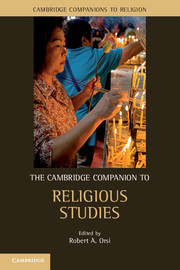Book contents
- Frontmatter
- Introduction
- Part one Religion and religious studies: the irony of inheritance
- Part two Major theoretical problems
- Part three Methodological variations
- 12 Buddhism and violence
- 13 Practicing religions
- 14 The look of the sacred
- 15 Reforming culture: law and religion today
- 16 Sexing religion
- 17 Constituting ethical subjectivities
- 18 Neo-Pentecostalism and globalization
- 19 Religious criticism, secular critique, and the “critical study of religion”: lessons from the study of Islam
- Index
19 - Religious criticism, secular critique, and the “critical study of religion”: lessons from the study of Islam
from Part three - Methodological variations
Published online by Cambridge University Press: 28 March 2012
- Frontmatter
- Introduction
- Part one Religion and religious studies: the irony of inheritance
- Part two Major theoretical problems
- Part three Methodological variations
- 12 Buddhism and violence
- 13 Practicing religions
- 14 The look of the sacred
- 15 Reforming culture: law and religion today
- 16 Sexing religion
- 17 Constituting ethical subjectivities
- 18 Neo-Pentecostalism and globalization
- 19 Religious criticism, secular critique, and the “critical study of religion”: lessons from the study of Islam
- Index
Summary
Over the past several years, a number of scholars have diagnosed a crisis in the field of the study of religion. Unlike previous debates within religious studies, this recent crisis has focused not so much on the object of study but on both the relationship of the researcher to his or her subject and the nature of research we as “critical scholars of religion” should conduct. Institutional and professional anxieties over the legitimacy of the field of religious studies within the broader academy have intensified the urgency of this debate. Above all, the dividing line between scientific scholarship and metaphysical speculation is increasingly drawn around the ill-defined notion of critique. As José Cabezón has cogently observed, “It is our commitment to a project defined … in terms of criticism, methodological rigor, theory, self-awareness and so forth – that we believe gives us … the wherewithal to clarify the opacities and to unmask the misrecognitions that are [supposedly] endemic to the first-order discourses and practices of religion that are constitutive of both our object and our Other.” The establishment of something called the critical study of religion, as opposed to theological assertion or parochial apologetics, has become the primary justification for the place of scholars of religion within the academy.
- Type
- Chapter
- Information
- The Cambridge Companion to Religious Studies , pp. 403 - 420Publisher: Cambridge University PressPrint publication year: 2011
- 1
- Cited by



